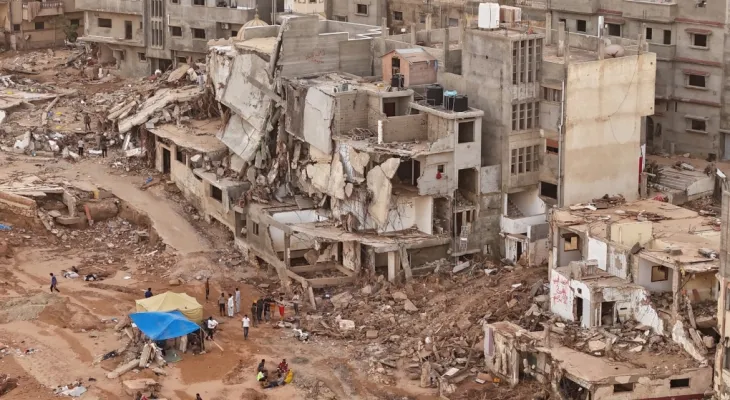Search here
Newspaper
Search here

Arab Canada News
News

Published: September 25, 2023
The Libyan Attorney General said today, Monday, that he has ordered the detention of eight current and former officials as part of an investigation into the collapse of two dams earlier this month, a disaster that led to a surge of water several meters high sweeping through a coastal city and resulted in the deaths of thousands of people.
The dams collapsed outside the city of Derna in September. On September 11, they were overwhelmed by Storm Daniel, which caused heavy rains in eastern Libya. Officials stated that the collapse of the structures resulted in flooding of up to a quarter of the city, destroying entire neighborhoods and sweeping people into the sea.
Government officials and relief agencies estimated the death toll to be between more than 4,000 and over 11,000. Many bodies of the deceased remain under the rubble or in the Mediterranean Sea, according to search teams.
A statement from the office of the Attorney General, al-Sadiq al-Sur, indicated that the public prosecutor interrogated seven current and former officials of the Water Resources Authority and the Dam Management Authority on Sunday regarding allegations that mismanagement, negligence, and mistakes contributed to the disaster.
The statement added that the mayor of Derna, Abdel-Moneim al-Ghaithi, who was dismissed from his position following the disaster, was also questioned.
The statement confirmed that the eight former and current officials did not provide evidence to absolve them of potential charges, and the prosecution ordered their detention pending the completion of the investigation. The Attorney General stated that eight other officials will be summoned for questioning.
The interrogation and detention of the officials is a crucial first step by the Prosecutor General in his investigation, which is likely to face significant challenges due to years of divided leadership in Libya. The growing calls for an international investigation into the disaster reflect a deep public mistrust of state institutions.
The oil-rich North African country has been in chaos since 2011 when the Arab Spring uprising broke out, supported by NATO, leading to the ousting of former dictator Muammar Gaddafi, who was later killed. For most of the past decade, rival administrations have claimed authority to lead Libya, with Dajch receiving support from armed groups and foreign governments.
The east of the country has been under the control of General Khalifa Haftar and his Libyan National Army, allied with a government backed by the parliament. A competing administration is based in the capital, Tripoli, enjoying the support of most of the international community.
The dams were built by a Yugoslav construction company in the 1970s over the Wadi Derna, a river valley that divides the city. Their purpose was to protect the city from flash floods, a common occurrence in the area. The dams had not been maintained for decades, despite warnings from scientists about the potential for their failure.
A report issued by a state-run auditing agency in 2021 stated that the dams had not been maintained despite more than $2 million being allocated for this purpose in 2012 and 2013.
A Turkish company was contracted in 2007 to maintain the dams and build a third dam between them. Arsel Construction Company Ltd. stated on its website that it completed its work in November 2012. It did not respond to an email requesting further comments.
Two weeks after the collapse of the dams, local and international teams are still digging through mud and hollow buildings searching for victims. They are also combing the Mediterranean Sea off Derna for the bodies of those swept away by the water.
The flooding from the dams has destroyed up to one-third of homes and infrastructure in Derna, according to the United Nations Office for the Coordination of Humanitarian Affairs (OCHA). The UN office stated that authorities evacuated the most affected part of the city, leaving only search and rescue teams.
The World Health Organization reports that more than 4,000 flood-related deaths have been recorded, but the head of the Libyan Red Crescent earlier indicated that 11,300 people had died. The Office for the Coordination of Humanitarian Affairs states that at least 9,000 people are still missing.
Among the deceased in eastern Libya are foreigners living in North African countries.
The storm hit other areas in eastern Libya, including the towns of Al-Bayda, Soussa, Marj, and Shahhat. Tens of thousands of people in the region have been displaced and have sought refuge in schools and other buildings.
Comments